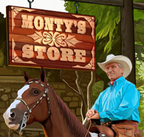I would really look foreword to seeing some videos on the 2 following things. (I'm sorry if people already asked for them):
1. A walk through on the different feeds to give you horse, how much to give them (approximately), and when to give it to your horse (approximately) for the yearling - adult horse.
2. How to take care of minor wounds that your horse may get without immediately contacting your vet.
Thank you!!
← back
University Suggestion Box
Horse Care

Rewards
Subscribe to Equus Online University and become a part of Monty's worldwide mission to leave the world a better place for horses and for people too.
Students automatically gain access to special rewards, such as exclusive discounts at the Monty Roberts Online Shop. Visit Monty Roberts Online Shop.



Hi. Oh boy, this is a huge subject. Possibly not suitable for the Uni because there are so many variables. Ok. Let's try & make a start. You mention a yearling. I have one & a 3 month filly foal. Feeding needs to be tuned to age, type, breed, work & owners preference. Ask 12 horsey people & you'll get 12 very different answers. I'll give you mine. The mare & the filly are fed alfalpha, course mix, carrots & apple. Alfalpha is great for good milk as it's high in calcium. It's also good for native ponies, living out in wintertime & bracing against the elements. You can feed a good amount, without molasses, damp in a bucket feed that won't blow all over the countryside, unlike hayledge or hay. Three winters ago we had lots of snow in Scotland so I increased the ponies feed & when the snow left they were all fatter! If you stable your horses then feed alfalpha sparingly until you understand each ones reaction to it.
I boil barley in winter. It's an old type feed. Do not be confused. You can buy barley ready to feed & that is nothing like cooking your own. When a grain is broken it takes about three weeks for the the food value to deteriorate to 30%. Barley is more heating than oats. When cooked it more than trebles in volume so you buy 25 kilos & get more feed than you know what to do with. You only need to make a small amount every two or three days to have a significant effect. Barley is great for weight gain or to maintain weight if living out. For the stabled horse or pony it can prove too potent! Oats are just 'go faster' food. Sugar beet is a good feed to add fibre. Old fashioned is still available but I favour the quick soak, speedy beet but use hot water. It expands about twice as much & gives your horse a warm feeds- like mothers milk- would you crave a lolly on a winters day? To sum up, I do not believe anyone can give you a hard & fast equine menu. There are just too many variables to take into account. I have not yet mentioned each horse or pony will have preferences. You need to be flexible & savvy. Try different menus & when they fail - change. Don't close your mind to anything. Our horses are our friends & deserve to have the best care & feed. We can provide. Cheers, Jo.
I agree Jo, feeding is a minefield, there are just so many different feeds out there now. I would say though if you get a 'specialist' young stock feed, feed it according to the animal NOT what it says on the bag. I used Bailey's Buck eye grow & win on mine when he was a baby, I was given the same advice, the reason I was given was that the joints will go rugby ball shaped!! How true this is I don't know I always feed to my eye and if I can just feel the animals ribs.
On the minor injuries front I keep, surgical scrub(same as hibiscus but cheaper),animal lintex, vetwrap, blue spray (terramicin ask your agri merchant),leg ice I also keep a pot of Oz Vet (Equus products) for the odd graze. This for me covers most things, I also keep a sports bottle with veg/sunflower oil in case of colic symptoms. You can put the bottle in the corner of the mouth and squirt some in, hold the head up til they swallow repeat then wait!
Hope this helps a bit.
God advice from all - I agree, it's a huge subject: I will just my own (well not my own of course, stuff I've learnt from experience/other experts) "top tips" overall rather than about specific food. In the UK, best expert for this (recommend his course) is Ian Vandeberghe via Intelligent Horsemanship
1. If it smells yummy to you it's too sweet for the horse! (usually molassed to death! - 'molasses' is just a fancy name for sugar)
2. Soaking beet/food etc. - make sure it's well soaked with no clumps - wait for it to stop expanding before you feed it - recently had a friends horse choke on clumped food
3. Feed companies want to sell you stuff - make sure the person giving advice or the researched article isnt' given/written by the employee of the same feed company it recommends!
4. Learn to read feed bag labels and what they actually mean (a lot of pure rubbish is waffled on about by supposedly knowledgeable horse people when it comes to feed!)
5. Keep it as simple and as close to nature as you can - if they are a good weight, not working, they don't need flippin pony cubes or whatever else the latest fashion is just 'cos everyone else is feeding them extra! ;-)
6. Be aware of "balancers" - what is it that we are balancing? If you don't know what the current levels are, how do you know what you are balancing? And to what new level? Most horses don't need any such thing and if they are lacking in something, find out what it is and give that - all balancers do is raise everything!
7. Most pasture (in UK) is rye grass for fattening cows and sheep - not good for horses; if you can access hedgerows, cut down young thistles, nettles, and a bit of rough grazing they love it
8. Now this last one is going to make me unpopular but I have to say it. Be very questioning and careful of quack remedies, herbal formulas, homeopathic promises and old fashioned recipes. Before anyone shouts at me (hahaha)I know that some people swear by whatever it is they use (even if it's swearing that giving the horse a poached egg while standing on one leg works and whistling Danny Boy as a worm ready!!) question everything. Explore it, if it makes sense, go for it, if it doesn't don't be afraid to discard it. Placebo affects and harmless treatments are perfectly fine and actually have their place in horse care but some stuff is downright dangerous.
Thank you everyone! I'll make sure to put more research into these topics until further notice!
I just want to chime in with vici here on #8, because I don't think it can be said enough.
Never take stuff on without a healthy dose of: "WHY & HOW?" Always do your homework (research) so you can make an informed descision.
.
By the way, that goes for almost every piece of information you receive today in the tsunami of information that washes over us daily through all the media out there, but espescially for stuff said to be healthy for you or your animal, or have certain effects on the functions of our bodies.
Ask, and ask again. If they can't explain it reasonably scientifically - think twice before you buy and use.
There are after all certain physical laws, and while I do believe there are "more things between heaven and earth" things still shouldn't be explained away with "Hay presto!" when they are sold commercially.
.
OK, getting off my soap box now! ;)
Hi, me again. I'd like to add that when my yearling was born I bought a well known brand of mare & foal mix. My vet had a 'sharp intake of breath' when I told her I boiled my own barley. I checked out the labelling & guess what, mare & foal mix, main ingredient was - you guessed, barley. That's why I went back to pasture mix & added barley until no longer needed for the summer.
I have a huge thing about feed manufacturers - well these are the guys who gave Britain BSC! My Apollo made it to 38 years & had a descent covering of flesh throughout. That was due to fresh boiled barley. Sure he had muscle loss but he was pleasing to the eye until the end. My problem is, for example, economy cubes. The sack shows the protein level but not the source! Now I know there is protein in ( & I am not suggesting anything proven here - this is just a possibility ) feathers. The meat industry must have a huge number of feathers to deal with. I try to buy feed I can identify & see what it is If that means I need to cook some of it myself then fine, that's how it will be. When Vicci & Kicki say do your research, I think they do mean deep research - I think we are on the same wavelength on this. Don't get me wrong, I'm all for making good use of all resources - just not in animal feed. Cheers, Jo
Jo, you make very good points indeed! My mare for instance reacts like a psycho if she has a chaff with alfalfa added!!!
So despite what feed company's say, you MUST treat the horse as an individual.
I don't feel feeding is a suitable subject for uni lessons as it's far too wide a field.
Re feathers as a protein source, i don't know how true it is, but a while ago there were reports of feathers being used in supermarket bread to bulk it out!!!
Not on the label!!!
I think we're all giving some excellent advice here! And we've probably gained this knowledge from our own mistakes over the years. Luckily my local Agri merchants have several members of staff with horses so get loads of ideas and advice of what they've used and discarded for whatever reason.
I try to keep feeding basic, my 28 y.o has A&P Weight Gain (she never carried more than she needed to) & Veteran Vitality, Tiggy & Winter have Healthy Hooves and Coarse Mix, but Winters may change if it needs to, then Beros has a small handful of mix as well once a day. They all have Tithebarn Bloom n Sheen vit/mineral and thats it! Works well for them they have good coverage and shiny coats with plenty of energy, although Tiggy could do with a bit less at times! He's been on 1 scoop of each per day since I can remember, even when we go away!
It's a case of finding what works best for each animal!
Hi. One more thing. I mix my feeds by hand not with spoon or stick. That's another reason to feed warm food, especially in winter! I make up two feeds. One is for the mare & foal to share - I use shallow, broad flexibuckets ( 4 inches high & 24 inches across approx ). The other is for yearling & his Dad to share but I take some of that for Max who is a fatty. These broad buckets are not good to carry a distance so feeds are taken to field in more normal buckets with lids. Mixing by hand once decanted makes sure each of the now three feeds is thoroughly mixed & you would not believe the number of tiny stones & other foreign stuff I have found & removed. It is also an opportunity to break up any clods of food. Yes, it's messy but effective. Cheers, Jo.
Hi all: I like what was said about taking everything with a grain of salt and about not jumping on every trend in feeding but feed to the individual. Some horses gain weight smelling feed, some need additional calories.
Even the comments made here on feathers can be misleading if the discussion/manufacturer are sourcing feather protein this is an amino acid extract used in infant formulas and cough syrups for babies with cows milk allergies. Its not simply ground up feather meal in all cases. Many of the great sources of nutrition such as livers, kidneys etc., of the animal world are required to be labelled as "by products" but the myth is that by products are not nutritious. Not everything is equal and as someone said we need to ask WHY ANd HOW. We need to keep an open mind as the population of the world expands and realize that the body(human or animal) needs nutrients(amino acids, vitamins,minerals,etc,) not ingredients(our body does not care where the methionine comes from swine, poultry or corn) as long as it is bioavailable.
We cannot know where or from what we will need to source nutrients from in the future.
OK - I'm off my soap box too :) Thanks for a great discussion and thought provoking group.
Hi. OMG. Thankfully, I'm older so will not see the day when we resort to eating spiders, ants etc - whether coated in chocolate or not. Yuk! Seriously, the point I was trying to make was that manufacturers are out to make money. The inclusion of cow body parts (unspecified) in animal feeds lead to 'mad cows disease ' (BSC) in Britain with devastating after effects both to the cows & our farming communities. As responsible horse owners we must ensure the feed we provide is safe, appropriate & nutritious. Where a bag of feed is very cheaply priced it should be regarded as inappropriate - it clearly is made from lesser ingredients, other ingredients and possibly ingredients that the wild horse would not choose for itself. It may be tasty & enjoyed but only because it is smothered in molasses or something. My apologies to anyone out there who eats an alternative diet, I meant no disrespect - it's just not what I would choose. Cheers, Jo.